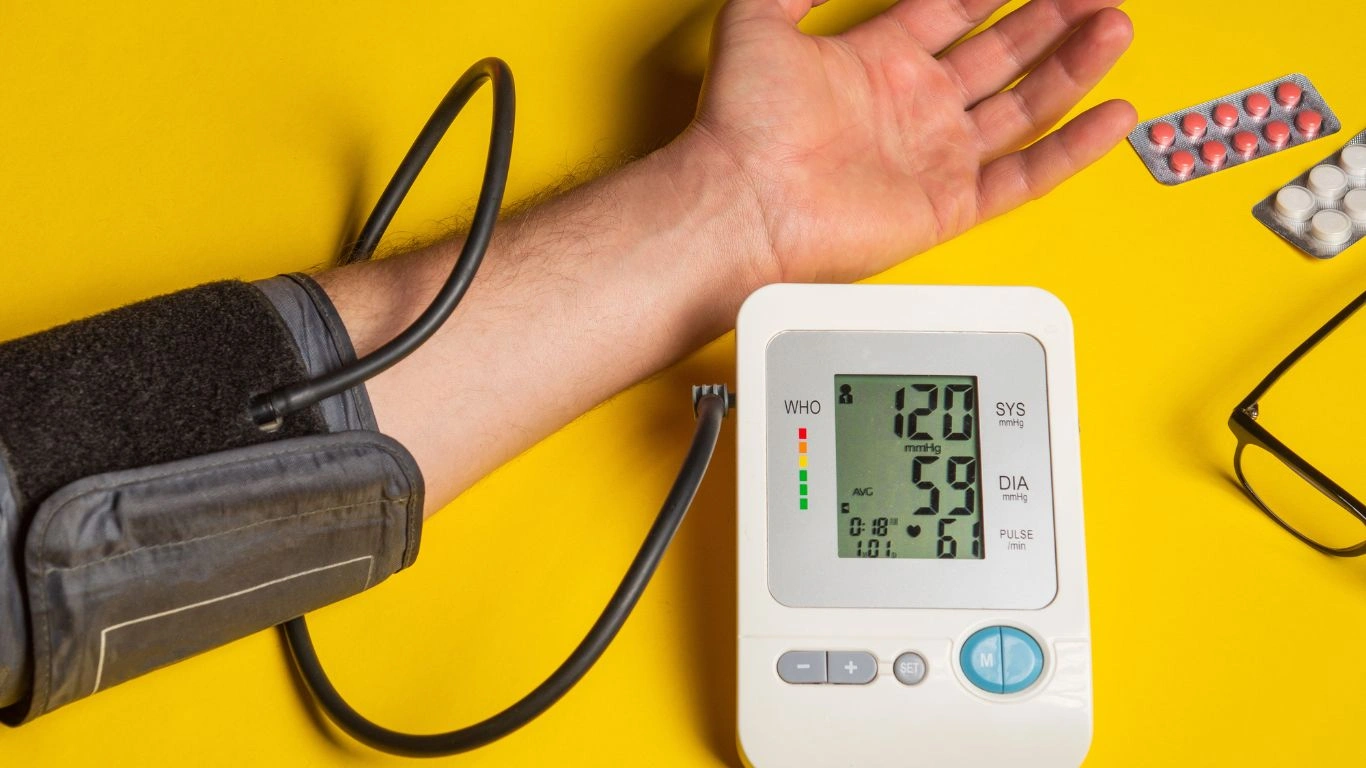The Hidden Effects of Overeating on Blood Pressure: How It Impacts Your Heart
As an internal medicine physician specializing in hypertension management, I’ve seen firsthand the profound effects that overeating can have on blood pressure. It’s one of those aspects of health that many people overlook or don’t fully understand, thinking that it’s only about the food we eat, but the consequences extend far beyond just weight gain. In fact, overeating can trigger a chain of events in your body that directly impacts your cardiovascular system, leading to elevated blood pressure levels. If you’re someone who loves to indulge in large meals or snacks, it might be time to pay attention to the impact overeating could have on your health. Trust me, the connection between overeating and high blood pressure is more real than you think!
The Connection Between Overeating and High Blood Pressure
So, how does overeating actually affect blood pressure? It’s more than just a simple “I ate too much” feeling. When we overeat, several physiological changes occur that can spike blood pressure levels and lead to long-term complications.
How Excess Calories Impact Blood Pressure
The main culprit here is the excess calories that come with overeating. Our body needs a certain number of calories for energy, but when we exceed that, we’re essentially overloading our system. This can result in weight gain, which, as many of us know, is linked to high blood pressure. However, the relationship between excess calories and blood pressure isn’t just about weight gain; it’s about how the body processes that food.
When you consume more calories than your body requires, your body stores the excess energy in the form of fat, particularly around your abdomen. This fat can lead to increased resistance in your blood vessels, making it harder for blood to flow freely. As a result, your heart has to work harder to pump blood through those narrowed vessels, raising your blood pressure. Additionally, the release of certain hormones, such as insulin, after overeating can cause your body to retain sodium, which also contributes to high blood pressure.

What Happens When You Eat Too Much Salt?
Another key factor to consider when talking about overeating and blood pressure is the role that salt plays in this equation. Most of us know that eating too much salt can lead to high blood pressure, but what’s often overlooked is how easy it is to consume large amounts of salt without even realizing it. Many processed foods, fast food, and even seemingly healthy options like pre-packaged salads and frozen meals can contain far more sodium than you might expect.
When you consume too much salt, your body tries to balance the sodium levels by retaining water. This increased fluid volume puts more pressure on your blood vessels, which can contribute to high blood pressure. In my clinical experience, I’ve often seen patients with uncontrolled hypertension unknowingly eat excessive amounts of sodium through their diet, only to be surprised when we discuss how much salt they’re really consuming. Sometimes, it’s those hidden sources of sodium that make a huge difference in blood pressure control.

The Role of Hormones in Blood Pressure Regulation
While overeating leads to weight gain and changes in your body’s fluid balance, it also triggers hormonal fluctuations that affect blood pressure. One of the main players in this is insulin. After a large meal, especially one that’s high in refined sugars or carbohydrates, your body experiences a spike in insulin levels. Insulin can cause your kidneys to retain more sodium, and that, in turn, raises blood pressure. Additionally, insulin resistance—a condition that develops over time with overeating—can contribute to higher blood pressure, as well as other cardiovascular risks.
Another hormone that comes into play during overeating is cortisol, the body’s primary stress hormone. Chronic overeating, especially when combined with stress, can cause elevated levels of cortisol, which can negatively affect your blood pressure. When cortisol is high, it leads to constriction of the blood vessels and an increase in heart rate, both of which contribute to an increase in blood pressure. It’s fascinating (and concerning) how our body reacts to these overeating-induced hormone surges.

Overeating and the Impact on Your Heart
It’s not just the blood vessels that are impacted by overeating. Your heart also takes a significant hit. As your body tries to deal with the extra calories, especially those that are high in fat and sugar, your heart has to pump harder and faster to keep up with the increased blood volume and pressure. This can eventually lead to heart strain and, over time, contribute to the development of heart disease. I’ve treated many patients who didn’t realize that their overeating habits were the underlying cause of their rising blood pressure, not realizing that the extra strain on their heart can lead to more severe cardiovascular issues.
To make matters worse, when blood pressure is left uncontrolled due to overeating, it can cause long-term damage to the heart and arteries, increasing the risk of heart attacks, strokes, and heart failure. This is why it’s so important to not only manage your weight but also be mindful of portion sizes and eating patterns to maintain healthy blood pressure levels.
How Can You Curb the Effects of Overeating?
Now, I know that it’s not always easy to resist the temptation to overeat. We’ve all had those moments when a big plate of food or a delicious dessert just seems irresistible. But there are a few simple steps that you can take to help curb the effects of overeating on your blood pressure.
- Practice portion control: By controlling how much you eat at each meal, you can reduce the chances of overeating and the negative effects on your blood pressure.
- Balance your meals: Ensure that your meals include a mix of lean proteins, whole grains, healthy fats, and plenty of vegetables to keep your body fueled without overloading it with excess calories.
- Stay hydrated: Drinking plenty of water can help flush out excess sodium and reduce the strain on your kidneys, which play a crucial role in regulating blood pressure.
Why Monitoring Your Diet Is Crucial for Blood Pressure Control
As we continue our conversation about the effects of overeating on blood pressure, one thing I want to emphasize is just how crucial it is to keep an eye on your diet. From my years of experience managing hypertension, I’ve come to learn that small, consistent changes to what you eat can make a significant difference in controlling your blood pressure. It’s not just about avoiding certain foods but understanding the bigger picture of how nutrition impacts your cardiovascular health.
The Importance of Reducing Processed Foods
One of the biggest dietary challenges we face today is the overconsumption of processed foods. These foods, often high in unhealthy fats, sodium, and sugars, are convenient, but they come at a steep price to our health. And trust me, I’ve seen it in many patients—overeating processed foods can silently but steadily push your blood pressure to dangerous levels.
In my practice, I often talk about the “hidden” salt in processed foods. Foods like canned soups, frozen dinners, and even some breakfast cereals contain far more sodium than you would think. Sodium is notorious for its ability to raise blood pressure by holding onto excess water in the body, which places extra strain on the heart. The thing is, many of us don’t even realize just how much sodium we’re consuming daily through these foods. That’s why I always recommend checking food labels carefully—especially if you’re looking to manage hypertension.

Fiber and Its Role in Lowering Blood Pressure
Another aspect of diet that plays a huge role in blood pressure control is fiber. It’s easy to overlook fiber, but this little nutrient packs a big punch when it comes to heart health. Fiber helps to regulate digestion, manage weight, and most importantly, it can contribute to lowering blood pressure. In fact, studies have shown that people who consume a diet rich in fiber tend to have lower blood pressure levels than those who don’t.
Incorporating more fiber into your diet isn’t as difficult as it sounds. Start by adding whole grains, fruits, and vegetables to your meals. These foods are not only high in fiber but are also packed with antioxidants and other nutrients that benefit your overall health. In my experience, when patients start focusing on fiber-rich foods, they often see improvements in both their blood pressure and weight. It’s a win-win!
The Role of Potassium in Managing Hypertension
Let’s talk about potassium. If there’s one mineral I constantly mention in my practice, it’s potassium. This mineral works wonders in balancing the effects of sodium on the body. Potassium helps relax the blood vessels, reducing the strain on the heart and lowering blood pressure. But here’s the thing: many of us don’t get enough potassium in our diets, which can make it harder for the body to regulate sodium properly.
Foods rich in potassium—such as bananas, spinach, sweet potatoes, and tomatoes—should be a regular part of your meals. In my experience, adding these potassium-rich foods can lead to noticeable improvements in blood pressure. It’s one of those easy changes that can make a real difference without being complicated. If you’re trying to bring your blood pressure back into a healthy range, potassium is an ally you don’t want to overlook.

How Overeating Affects Your Metabolism and Blood Pressure
We’ve talked a lot about the direct effects of overeating on blood pressure, but there’s another layer to this: metabolism. Overeating, especially when it becomes a regular habit, can lead to metabolic dysfunction. Metabolic syndrome, a condition characterized by high blood pressure, high blood sugar, excess abdominal fat, and abnormal cholesterol levels, is a common outcome of chronic overeating. This syndrome significantly increases your risk of developing cardiovascular diseases, including heart disease and stroke.
One of the main reasons overeating messes with your metabolism is due to the insulin resistance that often develops over time. Insulin is the hormone that helps your body use sugar from food for energy, but when you overeat too frequently, your body becomes less sensitive to insulin. This means that your body can’t regulate sugar and fat as efficiently, which eventually leads to higher blood sugar levels, weight gain, and of course, high blood pressure.
The Impact of Overeating on Insulin Resistance
Insulin resistance is one of the most important risk factors for both hypertension and type 2 diabetes. When your body is unable to use insulin effectively, the pancreas produces more insulin to compensate. This high insulin level is a contributing factor to the narrowing of your blood vessels, leading to higher blood pressure. It also promotes fat storage, especially around the abdomen, which further exacerbates the problem. It’s a vicious cycle: overeating leads to insulin resistance, which in turn contributes to high blood pressure and metabolic dysfunction.
As I often tell my patients, the key to breaking this cycle is to focus on portion control and making healthier food choices. Eating smaller, more frequent meals can help prevent insulin spikes and keep your metabolism functioning properly. If you’ve been overeating and are noticing symptoms like fatigue, weight gain, or difficulty managing your blood pressure, it might be time to reassess your diet and make changes that support better metabolic health.

Understanding the Long-Term Effects of Overeating on Your Heart
When you overeat regularly, especially foods that are high in fats and sugars, you’re also putting your heart at risk. As your blood pressure rises, your heart is forced to work harder to pump blood through your arteries. This increased workload can cause the heart muscle to thicken and stiffen, a condition known as left ventricular hypertrophy (LVH). LVH can increase the risk of heart failure and other cardiovascular diseases.
In my clinical experience, I’ve seen patients with long-standing high blood pressure who eventually developed heart problems that could have been avoided if they’d paid attention to their diet and portion sizes early on. It’s important to remember that high blood pressure isn’t just a number; it’s a reflection of how your cardiovascular system is functioning. Consistent overeating can lead to lasting damage that may affect your heart’s ability to function normally. This is why it’s crucial to get a handle on your eating habits sooner rather than later.
How to Regain Control Over Your Blood Pressure
By now, we’ve explored a lot about how overeating can impact your blood pressure, and if you’re feeling a bit overwhelmed, don’t worry—you’re not alone. Many people struggle with finding balance in their eating habits, especially when it comes to managing blood pressure. But here’s the good news: you can absolutely take control of your health and make positive changes. It’s all about making small, manageable adjustments that add up over time.
As someone who has worked with many patients in managing hypertension, I’ve seen the transformation that happens when someone truly commits to understanding how their eating habits affect their body. While it can feel daunting, I want to share some practical steps that can help you regain control over your blood pressure, starting right now.
Building a Heart-Healthy Plate
The first step toward managing your blood pressure is to build a heart-healthy plate at every meal. This might sound like a lot of work, but trust me, it doesn’t have to be complicated. A few simple guidelines can make a world of difference. When planning your meals, try to focus on the following:
- Fruits and Vegetables: These should make up a significant portion of your plate. They’re packed with potassium, fiber, and antioxidants that can help lower blood pressure and reduce inflammation.
- Lean Proteins: Opt for sources like chicken, fish, tofu, or beans instead of red meat. These options provide the protein your body needs without the added saturated fats that can raise cholesterol and blood pressure.
- Whole Grains: Foods like brown rice, quinoa, and whole wheat bread are great sources of fiber, which supports heart health and helps keep blood pressure in check.
- Healthy Fats: Avocados, olive oil, and nuts provide healthy fats that support cardiovascular health without the negative effects of trans fats or too much saturated fat.
Making sure that your meals are well-balanced is key. It’s not just about cutting out certain foods, but about adding in the ones that can nourish your body and help regulate blood pressure. The more variety you can get from natural, unprocessed foods, the better off you’ll be.

Mindful Eating: A Powerful Tool for Blood Pressure Control
Another important factor that is often overlooked in discussions about blood pressure is the way we eat. Mindful eating is one of the most effective—and simplest—ways to help manage overeating. It’s all about paying attention to your hunger cues, savoring each bite, and slowing down the eating process.
Many of us eat quickly, distracted by our phones or television, which can lead to overeating before our bodies even have a chance to signal that we’re full. By practicing mindful eating, you’ll be able to recognize when you’ve had enough and avoid the temptation to overeat. This can lead to better control over portion sizes, which, as we discussed earlier, is key to maintaining healthy blood pressure levels.
One simple tip is to try eating without distractions. Take a moment to sit down, chew slowly, and really enjoy your food. Not only does this help with digestion, but it also allows you to fully experience the flavors of your meal. Over time, you’ll start to notice that you’re more in tune with your body’s natural signals, and you’ll find it easier to stop eating when you’re satisfied—not stuffed.
Exercise: The Missing Piece in Managing Blood Pressure
We can’t talk about blood pressure management without discussing the role of exercise. I can’t stress enough how important regular physical activity is in helping to control blood pressure. Even if you’re eating well, regular exercise can amplify the positive effects of a healthy diet and help maintain blood pressure within a normal range.
The American Heart Association recommends at least 150 minutes of moderate-intensity aerobic exercise per week, or 75 minutes of vigorous exercise, along with muscle-strengthening activities on two or more days per week. And the best part? You don’t have to hit the gym for hours every day. Something as simple as a brisk 30-minute walk most days of the week can make a huge difference. I’ve had patients tell me that just incorporating a daily walk into their routine helped them see a noticeable drop in their blood pressure.
If you’re new to exercise, don’t worry about starting big. Start small with activities you enjoy, like walking, swimming, or biking, and gradually increase the intensity as you build stamina. The key is consistency. The more you stick with it, the better you’ll feel—and the better your blood pressure will respond.

Stress Management and Its Link to Blood Pressure
Finally, let’s talk about stress. As much as we may try to avoid it, stress is an inevitable part of life. However, chronic stress can have a significant impact on your blood pressure. When you’re stressed, your body releases hormones like cortisol and adrenaline that can cause a temporary increase in blood pressure. If this stress is ongoing, it can lead to sustained high blood pressure over time.
To counteract the effects of stress, it’s important to find healthy coping mechanisms. Exercise, meditation, deep breathing, and even just taking time to relax and unwind can help reduce the harmful effects of stress on your body. I encourage my patients to try relaxation techniques like progressive muscle relaxation or mindfulness meditation. Even just 10 minutes a day can make a big difference in lowering stress levels and, as a result, helping to manage blood pressure.
References
For more information on managing high blood pressure through lifestyle changes, I recommend checking out trusted health sources like the American Heart Association or consulting your primary care physician for personalized advice.
Always remember, when it comes to managing blood pressure, it’s not about perfection—it’s about progress. By making a few small changes each day, you can take control of your health and make significant strides toward maintaining a healthy blood pressure. And trust me, your heart will thank you for it in the long run!
Disclaimer: The information provided in this article is for educational purposes only and should not be considered medical advice. Always consult your doctor or healthcare provider before making any significant changes to your diet, exercise routine, or medication.

Dr. Gwenna Aazee is a board-certified Internal Medicine Physician with a special focus on hypertension management, chronic disease prevention, and patient education. With years of experience in both clinical practice and medical writing, she’s passionate about turning evidence-based medicine into accessible, actionable advice. Through her work at Healthusias.com, Dr. Aazee empowers readers to take charge of their health with confidence and clarity. Off the clock, she enjoys deep dives into nutrition research, long walks with her rescue pup, and simplifying medical jargon one article at a time.






